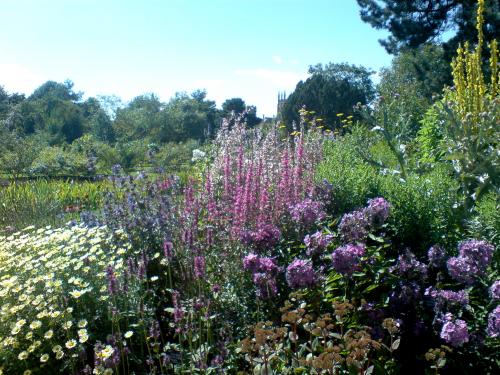
American expat Miranda has always wanted to live in England; she’s living that dream now in Oxford, where she studies and works. Here she shares with us the challenges and joys of living in the UK, cost of living information, her favorite things to do there, and how being an outsider in Oxford can be such a special experience.
In Southern California, USA.
-In which country and city are you living now?
Oxford, England.-Are you living alone or with your family?
I live with my partner, who’s English.
-How long have you been living in England?
A year and a bit
-What is your age?
21
-When did you come up with the idea of living in England?
I’ve always been attracted to England. From an early age, I resolved to move here. That was before I knew about visa issues and work permits, of course. But in my last term at university I came to Oxford to do a summer abroad and fell in love–with the city, the country, and a boy–and I realized that I wanted to make that dream I’d had so long ago a reality.

-Was it hard to get a visa or a working permit?
Yes and no. There aren’t a lot of options available for non-EU residents wanting to live and work in the UK. I was lucky enough to find BUNAC (http://www.bunac.org/) and participate in their Work in Britain program, so I had a six month temporary work visa to start out. But BUNAC is no longer operating this program.
Now I’m studying full-time for my master’s at a UK university, so I have a student visa. The only downside to this is the restriction on work: 20 hours a week, which, with the cost of living being so high in Britain, is just barely enough to get by.
-Was it difficult for you to get medical insurance before you went there or when you first arrived?
Not at all; England’s healthcare system makes it easy to sign up at a practice and receive regular, free, healthcare. Prescriptions have a flat fee (under £10). I’ve found it easier to receive healthcare in the UK than in the country I was born in.
-How do you make your living in the UK? Do you have any type of income generated?
I do admin work at an English language school. It’s bland work compared to my studies, but it’s exciting to be in such an international environment, and it pays my bills. I also do a few freelance writing gigs to supplement my income.
It didn’t take me very long to get the position when I first arrived. I tried to find a job where being a foreigner was actually an asset. Schools are great in this respect; my having studied abroad at university, having been an outsider in Oxford, means that I can be a resource to students who are now going through the same thing.
-Do you speak the local language and do you think it’s important to speak the local language?
I do speak the local language, of course–but that doesn’t mean that I automatically fit in, or that there aren’t huge cultural gaps between the locals and me. I’m always very aware of my outsider status, trying to learn as much as I can about the English people and respect the way they live. In some ways this is made easier because we share a common language, but in other ways it’s made harder: the differences are often more subtle.
I do think it’s important to strike a balance between assimilation and maintaining a sense of self. There are some ways in which, culturally, I feel more British than American; and as friends and family have pointed out, even the inflections in my voice have changed since I started living here. But there’s freedom as well in being an expatriate–and none of us should take for granted where we’re from. As my partner likes to point out, sometimes, I can break the cultural rules that he can’t (jumping ahead in a queue, holding a conversation on a bus) because, no matter how much I love it here and no matter how well I understand the culture, I’ll always be an outsider in some sense. I think that’s what makes living abroad so special.

-Do you miss home and family sometimes?
Of course; I’m an only child, so I think it’s especially hard for my parents and I, being so far apart. I grew up on a ranch on the coast of Southern California, so I miss the climate, the open spaces, the countryside. I miss being so close to the sea. But visits home usually quell these feelings; and the things that I’ve found I love in Oxford, and about it, excite me enough to keep me going. I do wish I could see my family more often, but the fundamental fact is that I’m happy here, and that means a lot.
-Do you have other plans for the future?
I’m working on it! I’m hoping to stay on in Oxford for at least another year after I get my masters. I’d like to do a doctorate here someday. In the meantime I’ll keep writing; ideally the work I do will allow me the freedom to move between cultures. Living abroad has taught me to respect flexability, and to enjoy not necessarily knowing where I’ll be two or three years down the line.
-What about housing, have you bought, or are you renting a home? How much do you pay for it?
My partner and I rent a house in East Oxford, a 15-20 minute walk from the center of the city. We’re very lucky; we have a beautiful three-bedroom house with a garden, but because we found it through a friend, we’re paying less for it than we would otherwise. Houses like ours generally go for about £1000-£1500 per month.

-What is the cost of living in the UK?
It’s very expensive here–more expensive than the big US cities (I was living in Boston before I came here). Possibly the most expensive aspect of living here is the pub–it’s such an engrained part of the culture, but it’s so easy to get sucked in. We do our best to keep our costs down–I cycle everywhere and neither of us has a car–and you just get used to it.
-What do you think about the English?
I’ve found some very close friends here, most of whom are English. But Oxford is also a city rife with foreigners. It’s in its essence academic place; it attracts minds, not nationalities. Nobody thinks twice if you’re not English.
There’s a quote from Max Beerbohm, in Zulieka Dobson, about Oxford: “The Germans loved it too little, the Colonials too much. The Americans were, to a sensitive observer, the most troublesome—as being the most troubled—of the whole lot…They were so awfully afraid of having their strenuous native characters undermined by their delight in the place.”
Obviously a lot has changed since 1911, but there’s still an interesting relationship between the locals and the foreigners. To me, living in a foreign city has always been about the city itself, and finding my place in it; not about forcing the city to form itself around me. I’ve known various outsiders to adopt this latter attitude, and it’s this, I think, which isn’t appreciated. But Oxford is exceedingly tolerant of newcomers, and if you make an effort, I’ve found, she’s happy to adopt you as one of her own, no matter your provenance.
Recently we had a funny conversation with a pair of friends; a couple, an English man and an Australian woman. He was musing that most of his English friends in longstanding relationships have foreign partners. It sounds arbitrary, but there may be logic in it, too. The English have, in some ways, a very closed, if also often beautiful, culture–interaction through apology, not speaking to each other in public situations unless pressed. And every society has its unwritten laws; I think it’s refreshing to both parties in an inter-cultural relationship to be with someone who isn’t afraid to break the rules that you yourself think are unbreakable.
-What are the positive and negative aspects of living in the UK?
It’s expensive to live here. And I’m far from my birthplace, and my parents. But that’s the tradeoff we make to do things like this, and the one thing I would say is that if you can’t reconcile that, you’ll never be truly open to living somewhere foreign.
The positive aspects? I could go on for ages. The people, the beauty (Oxford is one of the most stunning cities I have ever been in, and every day, cycling to and from work or wandering through town, I think to myself, how lucky am I, that I get to live here?), the history (my parents literally built their own house; here, the city walls date back to before Medieval times), the countryside, the pub. I have a great fondness for the pub. It’s unlike anything else I’ve ever experienced. It’s a social meeting place but also a respite from everything, a place to breathe a sigh of relief. We don’t have enough places like that in the world.

-Do you have any tips for our readers about living in England?
Read a lot. Visit the pub, not the nightclub, if you want to meet people, or interact with friends. Watch: be like Walter Benjamin’s flaneur, an observer of the city, a wanderer. Be utterly genuine, and utterly honest. Be gracious. Realize that in your role as outsider-on-the-inside, you have great power, great freedom, and the wonderful ability to learn about both the place you’re in as well as yourself; but also understand that this only works if you’re open to the experience.
-Do you have any favorite Web sites or blogs about England?
The best resources I have found on living in England are books. Kate Fox’s Watching the English is probably the best, from a sociological standpoint. But England, and Oxford specifically, has such a wonderful cache of quality literature about it that it’s hard to go wrong.
On the web, http://www.dailyinfo.co.uk is the best resource for living in Oxford. http://www.ukcosa.org.uk is good if you’re considering studying in the UK and, though it may be dull, the Home Office website at http://www.bia.homeoffice.gov.uk is the best place to go for information on obtaining visas and work permits.
Finally, I have a weblog in which my experiences abroad feature prominently. Visit me at http://www.mirandaward.co.uk/bodieswater for more…
I’m an expat, from Phila. area orignially…. Glad you are enjoying the UK. I have been here since 2000 and love it here. It’s home now!
Hi Miranda, Thank you for Sharing your Experiences.
Right now the idea of living in England is but a dream, but who knows. Right now I’ll enjoy reading your blog and your experiences. Thank you again.
Kris